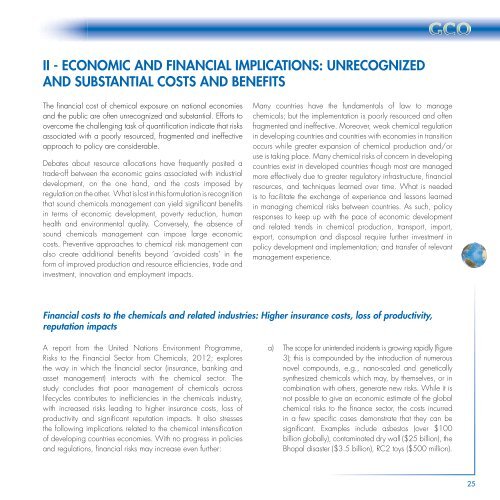Global Chemicals Outlook - UNEP
Global Chemicals Outlook - UNEP
Global Chemicals Outlook - UNEP
You also want an ePaper? Increase the reach of your titles
YUMPU automatically turns print PDFs into web optimized ePapers that Google loves.
II - ECONOMIC AND FINANCIAL IMPLICATIONS: UNRECOGNIZED<br />
AND SUBSTANTIAL COSTS AND BENEFITS<br />
The fi nancial cost of chemical exposure on national economies<br />
and the public are often unrecognized and substantial. Efforts to<br />
overcome the challenging task of quantifi cation indicate that risks<br />
associated with a poorly resourced, fragmented and ineffective<br />
approach to policy are considerable.<br />
Debates about resource allocations have frequently posited a<br />
trade-off between the economic gains associated with industrial<br />
development, on the one hand, and the costs imposed by<br />
regulation on the other. What is lost in this formulation is recognition<br />
that sound chemicals management can yield signifi cant benefi ts<br />
in terms of economic development, poverty reduction, human<br />
health and environmental quality. Conversely, the absence of<br />
sound chemicals management can impose large economic<br />
costs. Preventive approaches to chemical risk management can<br />
also create additional benefi ts beyond ‘avoided costs’ in the<br />
form of improved production and resource effi ciencies, trade and<br />
investment, innovation and employment impacts.<br />
Many countries have the fundamentals of law to manage<br />
chemicals; but the implementation is poorly resourced and often<br />
fragmented and ineffective. Moreover, weak chemical regulation<br />
in developing countries and countries with economies in transition<br />
occurs while greater expansion of chemical production and/or<br />
use is taking place. Many chemical risks of concern in developing<br />
countries exist in developed countries though most are managed<br />
more effectively due to greater regulatory infrastructure, fi nancial<br />
resources, and techniques learned over time. What is needed<br />
is to facilitate the exchange of experience and lessons learned<br />
in managing chemical risks between countries. As such, policy<br />
responses to keep up with the pace of economic development<br />
and related trends in chemical production, transport, import,<br />
export, consumption and disposal require further investment in<br />
policy development and implementation; and transfer of relevant<br />
management experience.<br />
Financial costs to the chemicals and related industries: Higher insurance costs, loss of productivity,<br />
reputation impacts<br />
A report from the United Nations Environment Programme,<br />
Risks to the Financial Sector from <strong>Chemicals</strong>, 2012; explores<br />
the way in which the fi nancial sector (insurance, banking and<br />
asset management) interacts with the chemical sector. The<br />
study concludes that poor management of chemicals across<br />
lifecycles contributes to ineffi ciencies in the chemicals industry,<br />
with increased risks leading to higher insurance costs, loss of<br />
productivity and signifi cant reputation impacts. It also stresses<br />
the following implications related to the chemical intensifi cation<br />
of developing countries economies. With no progress in policies<br />
and regulations, fi nancial risks may increase even further:<br />
a) The scope for unintended incidents is growing rapidly (fi gure<br />
3); this is compounded by the introduction of numerous<br />
novel compounds, e.g., nano-scaled and genetically<br />
synthesized chemicals which may, by themselves, or in<br />
combination with others, generate new risks. While it is<br />
not possible to give an economic estimate of the global<br />
chemical risks to the fi nance sector, the costs incurred<br />
in a few specifi c cases demonstrate that they can be<br />
signifi cant. Examples include asbestos (over $100<br />
billion globally), contaminated dry wall ($25 billion), the<br />
Bhopal disaster ($3.5 billion), RC2 toys ($500 million).<br />
25

















